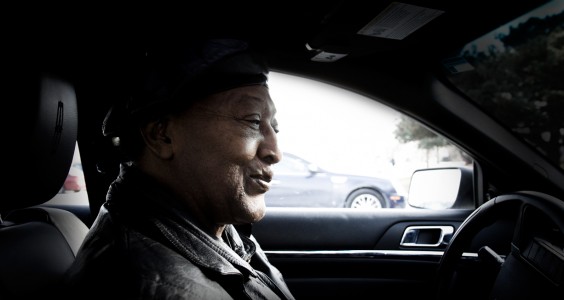Once a week, photo journalist Brian Leli has a brief behind-the-scenes encounter with a compelling band, musician, or artist and reports back on the experience.
Chicago, IL: “I heard it on the radio,” L.C. Cooke recalls. “That’s how I found out. Oh, man, it tore me up. I couldn’t believe it.” His voice is tempered, bruised slightly.
One must first go back to December 11, 1964. Soul pioneer Sam Cooke has already made the leap from gospel to pop and R&B. He has already released 29 hits in only seven years, and touched the hearts of millions. He has already left home. He has already gone to visit his friend and musical companion Lou Rawls. His mere presence has already sent the dog out of the room, the baby into tears. It is night, and Sam has already checked into the hotel. He has already rushed out of his room and into the hotel manager’s office — he has already been shot, and shot again, and then shot again. It is very late — very loud, then very quiet.
Rawls got the phone call in the middle of the night. Sam’s brother L.C. heard it on the radio.
“Yeah, it got harder before it got easier,” he shares this afternoon. “As time goes on, it softens it up a bit.” It is early January — sunny and mild. L.C. is turning backward through the years. His voice is proud but turned down some, softened slightly. For a moment, he is almost whispering.
L.C. walks slowly down a hallway at the Christ Universal Temple — a massive building that towers over the corner of 119th and Ashland, on the south side of Chicago. Everyone inside is happy to see him. They light up as he walks toward them, and glow brighter yet as he walks away. One of his legs, maybe his right, appears to be bothering him. But one cannot say for sure. He does not talk about it. He talks only about his older brother, Sam. In just a few days, on January 22, Sam Cooke would have been 80 years old, a politician, L.C. has decided. And one is inclined to believe him. He has had 46 years to think it over.
L.C. has barely taken his seat in the Archives room of his church, but already, he is seven years old again. Sam is nine and singing to the popsicle sticks he has stuck in the ground. He explains to L.C. that he is practicing, that he will never work a day in his life — that the system is designed to keep one broke, and that he would rather not be a part of such a system. And that, someday, he is going to be a famous singer.
“If you write something simple, something that a baby can hum, it’ll be around for a long time. Make it melodic, but make it simple. Make it so the world can understand.”
Sam could always pick whom the stars would be. The ones over here — Aretha Franklin, Bobby Womack, Lou Rawls — they will one day touch the sky. But that one over there — have you ever seen the way he treats people? Have you ever heard the way that he talks to them? It is enough to make one sick. No, that one over there, he will never leave the chitlin’ circuit. “And when [that person] died,” L.C. says, “he was still singing in the chitlin’ circuit.”
Sam treated those around him like gold, L.C. recalls. And those around Sam treated him like a god.
There was a time, L.C. recalls, before Sam ever left the gospel circuit, when people were beside themselves in his presence — climbing and falling to the ground just for a chance to touch him. One Sunday, as Sam walked through the church in which he was about to sing, the hands reaching for him held money. In exchange for the brush of a hand, a wrist, a stitch of clothing even, was over 400 dollars. Sam had yet to sing a note.
Once upon a time, L.C. goes on, Jackie Wilson began coughing up blood, trying and failing to out-sing Sam on tour. But Sam could simply bite his lip and close his eyes, and the voice that moved through him would be like that of a shaman.
“I listen to what people say — how people talk, how people act — and that’s where I get my hooks from.” They are Sam’s words. But L.C. is looking after them. “If you write something simple, something that a baby can hum, it’ll be around for a long time. Make it melodic, but make it simple. Make it so the world can understand.” Volumes of them — memorized, catalogued. “You can do whatever you want to do in life. But you’ve got to give up something to achieve it.” This is L.C.’s favorite. He lives by it, just like Sam did.
On the day of his funeral, it is bitter cold — the kind of cold that brings pain, numbness, death. If one were to spit, it would shatter into tiny pieces at one’s feet. Someone has broken the front glass doors of the funeral home. But whom it was, who is to say? There are maybe 10,000 people standing in the streets outside — maybe more. The confusion is so great that L.C. almost does not make it inside behind his brother Charles. His brother? But his brother has just gone inside. No! A police lieutenant recognizes L.C. and walks him in through the shattered doors. There are so many people that it is compared to a rock concert. But there is no music, and it is very cold.
“I miss him to this day, man,” L.C. says, running through each of them once more. “Forty-six years. And I miss him to this day.”
L.C. walks past the elevator and down the stairs at his church. The leg that is bothering him, whichever it may be, can still make it down steps all right. He says his goodbyes and walks outside to his car, a shining white Lincoln with black leather interior, spotless. When he starts the car, Sam comes through the speakers. He is onstage at The Copacabana. The year is 1964 — the song is “Frankie and Johnny.” Before driving off, L.C. sits and listens for awhile. He is smiling, staring at the screen of his car’s digital jukebox. All of Sam’s songs are on there, and even a few of his own. L.C. was a wonderful singer once as well. When Sam’s song ends, L.C.’s begins. It is one that he recorded in 1958: “Please Think of Me,” a ballad from another life.
“Boy, we had some good times,” L.C. drifts off.
Often times, people will stare into the direction of the music they are listening to, looking for something that is not there — something more, something less, something that is just out of reach. And, no matter how much it may seem that, this time, it should be different; it is not. And it’s all right, but also it is not.



1 thought on “ALARM Dispatches: Remembering Sam Cooke”
Comments are closed.